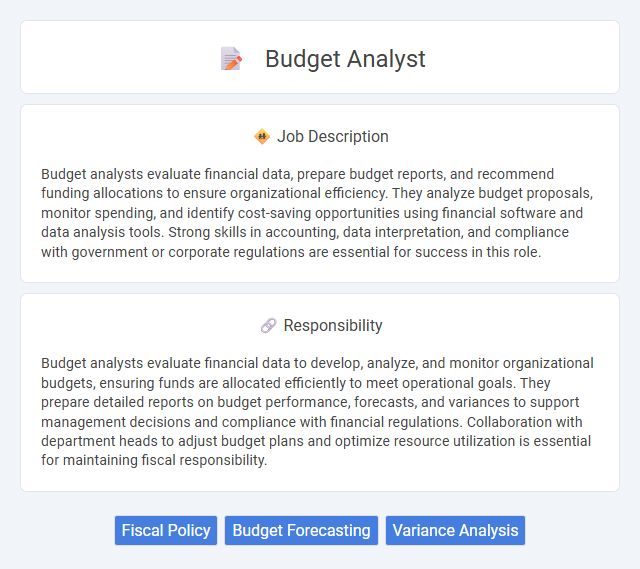
Budget analysts evaluate financial data, prepare budget reports, and recommend funding allocations to ensure organizational efficiency. They analyze budget proposals, monitor spending, and identify cost-saving opportunities using financial software and data analysis tools. Strong skills in accounting, data interpretation, and compliance with government or corporate regulations are essential for success in this role.
Individuals with strong analytical skills and attention to detail are likely to thrive as budget analysts due to the job's demand for precise financial planning and forecasting. Those who prefer working with numbers, enjoy problem-solving, and can manage multiple deadlines may find this role particularly suitable. Candidates who struggle with data analysis or feel uncomfortable interpreting complex financial information might face challenges in this position.
Qualification
A budget analyst typically requires a bachelor's degree in finance, accounting, economics, or a related field, with certifications such as Certified Government Financial Manager (CGFM) enhancing job prospects. Proficiency in financial software, data analysis, and strong analytical skills are essential for assessing budget proposals, monitoring expenditures, and ensuring fiscal compliance. Experience in financial reporting, strategic planning, and knowledge of government or corporate budgeting processes significantly benefit candidates in this role.
Responsibility
Budget analysts evaluate financial data to develop, analyze, and monitor organizational budgets, ensuring funds are allocated efficiently to meet operational goals. They prepare detailed reports on budget performance, forecasts, and variances to support management decisions and compliance with financial regulations. Collaboration with department heads to adjust budget plans and optimize resource utilization is essential for maintaining fiscal responsibility.
Benefit
Budget analysts are likely to experience benefits such as competitive salaries and comprehensive health insurance packages. There is a good probability of gaining valuable skills in financial planning and analysis, enhancing long-term career prospects. Opportunities for advancement and job stability may also be strong in this field due to increasing demand for budget management expertise.
Challenge
Budget analyst roles often involve the challenge of accurately forecasting financial needs amid fluctuating market conditions and organizational priorities. The analyst may need to reconcile competing demands for limited resources while ensuring compliance with strict regulatory guidelines. Navigating these complexities likely requires strong analytical skills and adaptability to produce reliable budgetary recommendations.
Career Advancement
Budget analysts play a crucial role in financial planning by evaluating budgets, forecasting expenditures, and identifying cost-saving opportunities to ensure organizational efficiency. Career advancement often leads to senior financial analyst positions, budget managers, or financial controllers, with increased responsibilities in strategic planning and resource allocation. Developing expertise in financial software, data analysis, and regulatory compliance significantly enhances promotion prospects in the budget analysis field.
Key Terms
Fiscal Policy
Budget analysts specializing in fiscal policy evaluate government spending and revenue programs to ensure alignment with economic goals and legislative requirements. They analyze data from public sector budgets, forecasting the impact of fiscal measures on budget deficits and economic growth. Expertise in financial regulations and economic trends allows budget analysts to recommend adjustments that optimize resource allocation and maintain fiscal discipline.
Budget Forecasting
Budget analysts specialize in budget forecasting by analyzing financial data, identifying spending trends, and projecting future costs to help organizations allocate resources efficiently. They employ advanced statistical models and software tools to estimate revenue and expenditure patterns accurately. Effective budget forecasting enables companies to plan strategically, avoid overspending, and achieve financial stability.
Variance Analysis
Budget analysts specialize in variance analysis by examining financial discrepancies between budgeted and actual expenditures to identify cost overruns or savings. This process involves detailed data collection, trend evaluation, and reporting to inform management decisions and improve future budget accuracy. Proficiency in financial software and strong analytical skills are essential for accurately interpreting variances and recommending corrective actions.
 kuljobs.com
kuljobs.com